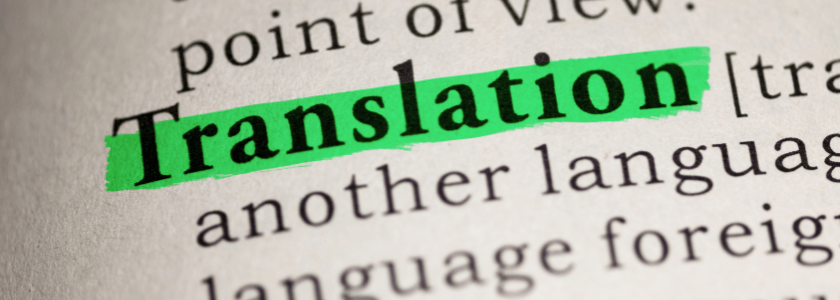SEO is one of the ultimate buzzwords these days: everybody wants it, but most people don’t even know what it is or how it’s done – let alone if and how it should be done when you’re localising content. So let’s shed some light on Search Engine Optimization and how to treat it in localisation.

Most of you will know it, but simply put, Search Engine Optimisation (aka SEO) is a process that’s supposed to make sure that your website will be found on Google. Ideally, your website or its individual page appears on top of page 1 on Google for certain keywords.
By using important keywords and their synonyms throughout your page and in the meta texts and by carefully crafting your content so it actually provides value to your readers, you can make sure that readers find your page, click on it, stay on it and maybe even interact with it – which isn’t just great for your company, but also for SEO.
While some SEO and marketing companies might have you believe that it’s all about ranking highly, that’s really just one part of the equation. Sure, being one of the first few Google results is great – but if your content doesn’t bring value, you’ll just end up with high bounce rates (which are penalised by Google, so bad for SEO).
Your content has to bring value to the readers, and it’s important that you meet the reader’s expectations – if you lure them in by making them think your page will provide a sensible explanation to something they’re researching, but then only get them on a sales page where the info they need can’t be found, they’ll get off you page right away again. And Google doesn’t like that, so your page will start to rank lower.

To avoid that, you have to remember three things:
- You don’t just have to use the right keywords in the right places, you also have to think about what the users want from your page. This is called search intent and you should always take some time to think about it, before you optimise a page.
- Your meta texts have to be engaging and informative to get people to visit your page and to give them the right idea of what they will find on the page.
- The page itself has to be well-written and meet the readers’ expectations.
And all of that is true for monolingual websites as well as for localised ones.
Search Engine Optimisation in localisation – more than translation
Let’s assume you have a great website, ranking highly in your own language. People click on it and love the content you have there. Now you’re expanding your business and are having your website translated (awesome!!! 🥳) but you’re wondering if simply translating the keywords and meta text will be enough to achieve the same great SEO results in the localised version of your website.
In most cases, the answer will be no.
One of the most important things to keep in mind here is that just translating keywords and then using those that rank highest in the localised website usually misses a lot of great opportunities. The problem with keywords is that they don’t translate well, and people might be googling differently in your new target market than they are in your own country.
Often, a word or phrase can be translated in various ways. So if you’re simply translating one single phrasing that’s ranking highly in your current market and checking how it ranks in the new market, that approach can be a huge hit-and-miss. A certain phrasing might not be searched for at all in the new language, simply because it’s not exactly idiomatic or because another synonym is used more often in this specific context.
And that’s why you need a localised keyword research and transcreation for SEO.

Don’t just translate your SEO keywords
A lot of times when I’m working on a website translation, I get a list of keywords to incorporate. While this usually feels like a win at the beginning, that feeling usually doesn’t last because often, these lists are provided by a non-native agency or the client themselves, and in most cases, they are practically unusable.
The problem is that they are often nothing more than translations of the keywords used in the source material – even worse, they are often (bad) machine translations of the keywords used in the source material.
These translated keywords are usually not idiomatic, don’t reflect how people actually talk (and therefore google) and don’t contain any synonyms.
If I just blindly use such keywords in website localisation or the transcreation of blog articles, you won’t get the desired results. Instead, you’ll get unidiomatic texts that are repetitive, that won’t rank high and that users won’t enjoy reading – which are all red flags for SEO.
So how can you avoid this? The answer is simple:
Have your translator localise your SEO keywords
If you want successful search engine optimisation for your translated website, it’s always a good idea to use a translator who knows their way around SEO and keyword research as well as around great translation.
They are usually happy to research good SEO keywords for your content and implement them into your localised website. The great thing with having your translator do both tasks is that the two services actually complement each other.
- On the one hand, they’ll have a look at the material to be transcreated before doing the SEO keyword research. This way, they know exactly what any given page is about and therefore will research a greater variety of possible SEO keywords – so you’ll get idiomatic, versatile keywords with different phrasings that you’d likely miss out on if you’d simply translate the existing keywords.
- On the other hand, doing the SEO research before working on the transcreation will actually help them in incorporating more keywords overall in the text: the main keyword will be in the headers and meta texts, but when they also found a couple of other phrasings that are looked up frequently, but not often enough to become a keyword, they’ll know about those and can use them naturally as synonyms throughout the page. This way, you get a more versatile list of keywords, which increases the pages chances to rank highly.
As you can see, there are definitely some upsides to having one person do both, the localised SEO research for your website and its transcreation.
Luckily, many translators are diversifying their services, which means that many of them do offer at least basic SEO – so if you’re thinking about having your website translated and would like to implement a search engine optimisation strategy, try finding a translator who does both.
You know, such as myself. 😉



